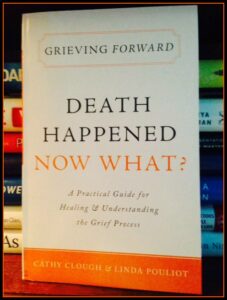Secondary Loss Can Catch Us Off Guard
Secondary loss can catch us off guard. Sometimes it stays under the grief radar—and because it does it makes healing more difficult. Which is why it’s so important to know about!
Secondary loss is the direct result of the initial loss. For example, the death of a loved one may change someone’s financial situation and they may have to sell their house. The loss of the house is now a secondary loss—so is the financial change. Another example would be after the death of a parent the child misses the companionship that they shared with their parent and being cared for by their parent. Sadly, relationships can change too after the death of a loved one—people disappear into the woodwork or make themselves unavailable. More to grieve.
So, yes. Secondary loss can catch us off guard. And secondary loss results in more Grief Work for us to do. This is why it is so important to identify all of the secondary losses that you are dealing with and to acknowledge each one. Because doing so supports healing.
Secondary Grief Is Secondary Grief
Secondary loss is often referred to as secondary grief. This is because a secondary loss is not necessarily less important, less intense or less difficult to grieve. In fact, for someone, a secondary loss can be more difficult than the initial loss to grieve and heal from—even when the initial loss is the death of a loved one.
Making healing even more difficult is the fact that most of the time we find that we have to deal with multiple types of secondary loss—occurring concurrently or consecutively. In an effort to make healing happen faster we sometimes try to multitask our grief away. However, this does not work.
See Jessica Fein Why Secondary Losses Are Especially Punishing
Why Multitasking Does Not Work
Besides recognizing the importance of identifying all of the different types of secondary loss that you are dealing with for your healing—it’s also important to come to terms with the fact that it is not humanly possible to grieve multiple types of loss all at the same time. In fact, as difficult as it may be to accept, multitasking is a myth. Yes. It’s a myth. Our brain is not designed to multitask!
See (LinkedIn) Dr. Caroline Leaf The Myth of Multitasking
This Is How Healing Works
Sometimes we grieve and heal one loss at a time—other times we rotate or toggle between each loss—grieving and healing a little bit at a time. On some days we do a little bit of each. Again, there is no way to make healing happen any faster than it does—and knowing and accepting the fact that you can’t multitask your way out of your grief experience is a really good thing. Because it removes the possibility of generating any self-imposed and unnecessary extra stress related to thinking that you can do something that is not possible—multitasking—and wondering why you can’t get it to work.
Which Takes Us Back To
The original list of life events that can trigger grief. Because this list is also a list of life events that can cause secondary grief—or secondary loss. Never underestimate or minimize how hard you are working. And never forget that the payoff for all of your hard emotional and mental grief work is healing. Take a minute and review the list again. And this time check off each secondary loss that you are dealing with.
Life Events That Can Trigger Grief
- Death of your spouse
- Death of your life partner
- Death of your betrothed
- Death of your child
- Death of your sibling
- Death of a parent
- Death of a stepparent
- Death of a family member
- Death of a close friend
- Death of former spouse/partner
- Death of a co-worker
- Death of your pet
- Death of your business
- Your divorce
- Your parents’ divorce
- Your child’s divorce
- Parent remarrying
- Marriage of child
- Your remarriage
- Loss of employment
- Change in work responsibilities
- Job relocation
- Retirement
- Negative change in your health
- Negative change in a loved one’s health
- Loved one in Hospice
- Legal issues
- Incarcerated
- Negative change in financial state
- Foreclosure
- Empty nest
- Adult child moving back home
- Rejection by in-laws
- Selling your home
- Abandoned by parents/family
- Your placement in Foster Care
- Your parents Parental Rights terminated
- Your child placed in Foster Care
- Your parental rights terminated
- Your Foster Child returned to biological parent(s)
- Your Foster Child adopted into a family other than yours
- Placing your child for adoption
- Your grandchild placed for adoption
- Closed adoption
- Open adoption
- Disabled child—Loss of the dream(s) you had for your child
- Changing churches
- Changing schools
- Moving to a different home
- Abortion—Forbidden Grief
- Suicide
- Medical personnel grieving the loss of a patient(s).
- First responder grieving the loss of an accident victim(s).
- Students grieving the loss of a fellow student(s).
- Wanted change
- Loss of trust
- Loss of safety
- Loss of what could have been
- Loss of normality
- Lost Connections
- Government Lock Down/Loss of freedom
Secondary Loss And Children
Your children are most likely experiencing different types of secondary loss too. Support their healing—in an age-appropriate way—when explaining and validating what they have experienced–the initial and secondary loss as it relates specifically to them. This is important because—your goal for each child is the integration of the loss into their personal and ongoing life story—in a healthy and productive way. Because the end goal for each child is healing too.
See Children’s Bereavement Center Secondary Changes Impacting Children After Loss
Healing Insight
There are many factors that impact grief. See Factors That Impact Grief. Secondary loss is one of these factors. Instead of becoming overwhelmed—embrace what you are learning. Including what you are learning about secondary loss. Because this is all about your healing journey. Some days it’s one baby step at a time and other days it’s take a break or take a nap.


